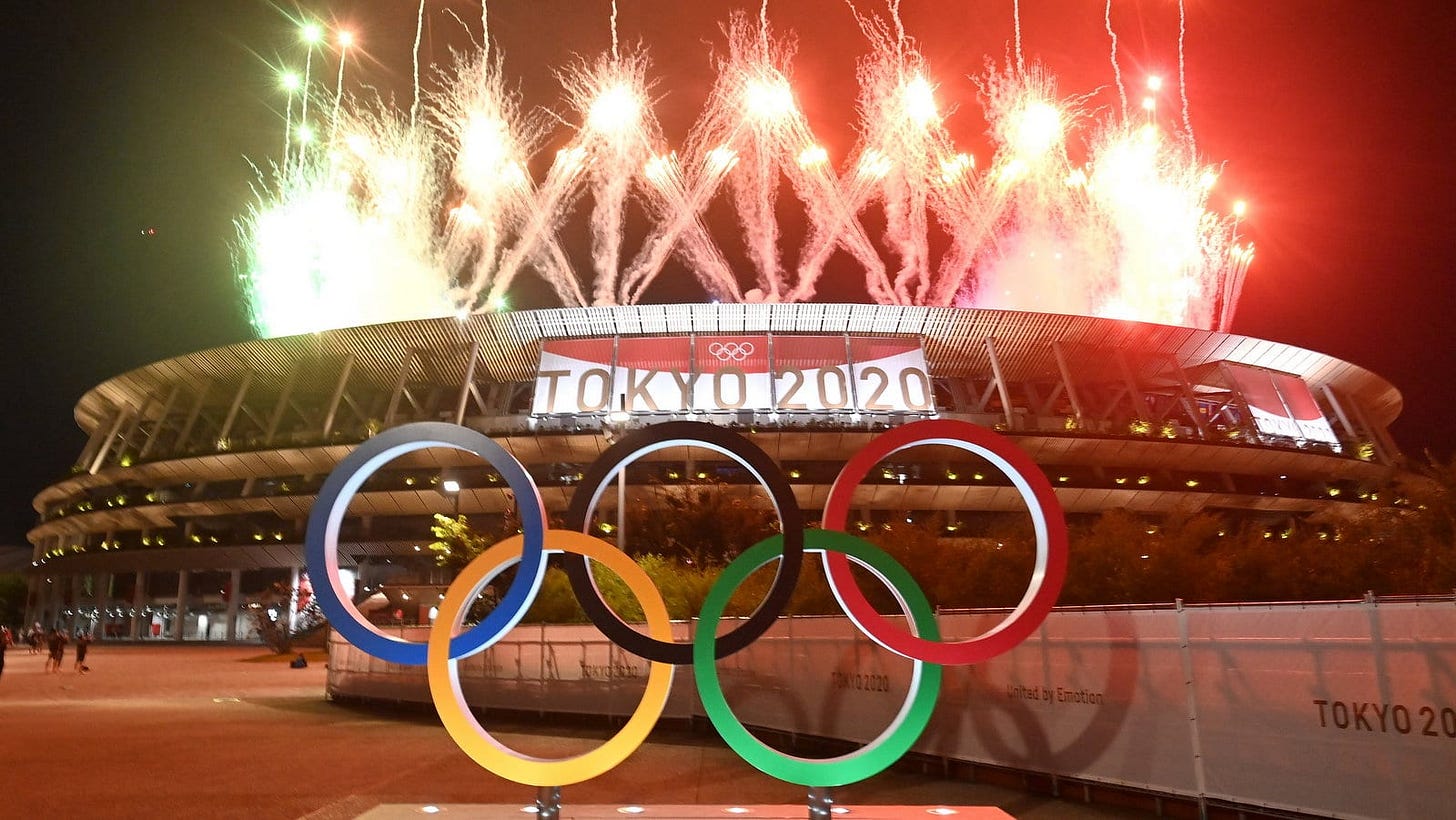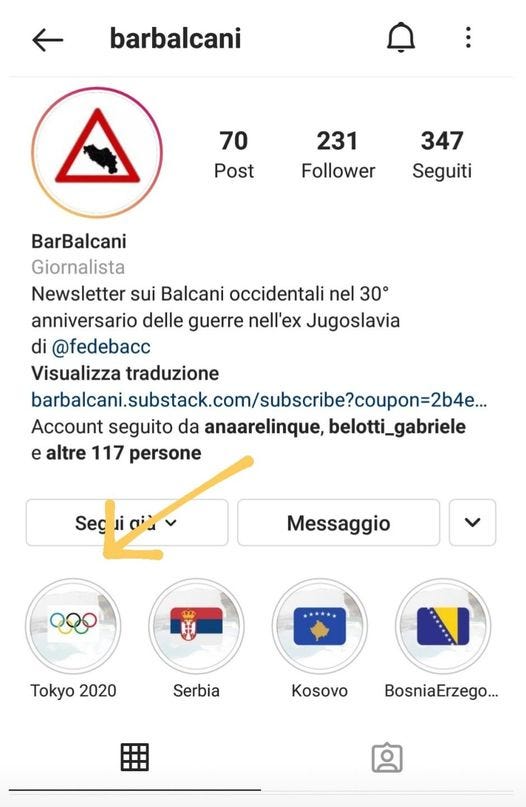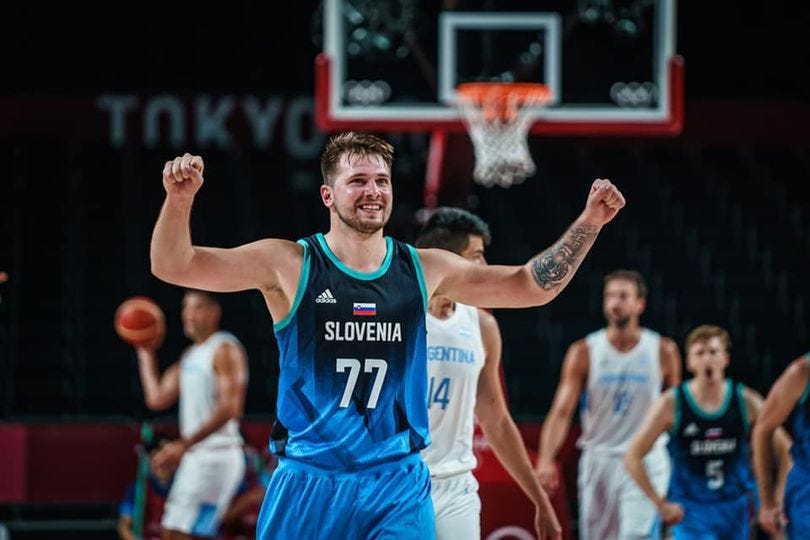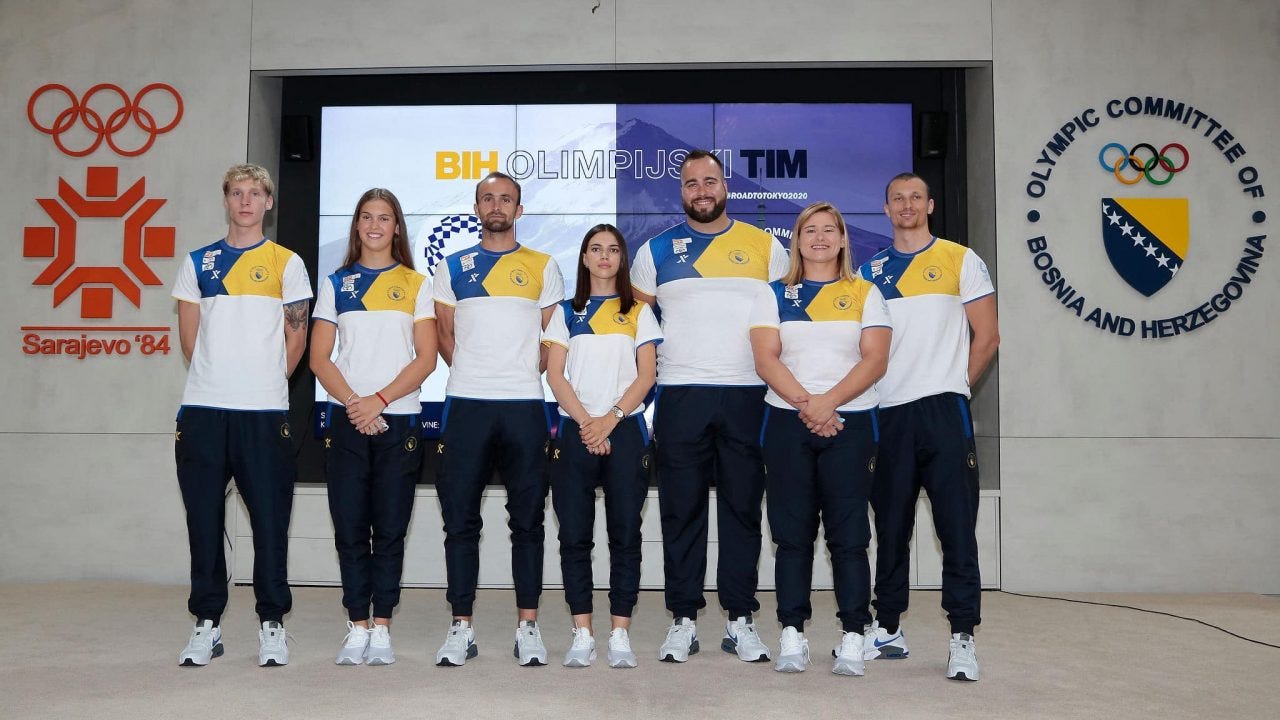S2E1. Back from Tokyo 2020
BarBalkans' journey resumes with a new season, a new logo and a new mission. And through an immersion into the last Olympic Games' experience lived by Balkan athletes
Hi,
welcome back to BarBalkans, the newsletter with blurred boundaries.
Here we are, finally! We are on our way again.
First of all, as I anticipated you on a midsummer Saturday, from today BarBalkans has a new logo!
We have to thank Letizia Ortolani, communication designer and great friend, who refreshed the project with original and genuine ideas.
In the new logo, the brackets are open and closed, they intertwine and blend together.
These brackets are metaphors for blurred boundaries.
Like the blurred boundaries among the (Italian) words that are characterizing our trip: bar, barba (beard), Balcani (Balkans).
Like the blurred boundaries among the countries and the peoples of the region that we are discovering.
They live of contrast and conflict, and share the same history and traditions.
Boundaries define identities. But at the same time they foster the exchange of experiences, showing that physical limitations can be overcome by human relationships.
You can be trapped within boundaries. Or you can start from there to discover what lies beyond those limits.
This is a logo to be looked again and again, trying to understand the complexity of the reality that is hidden under apparent unity.
And now we can resume our journey.
Our starting point is Japan. Specifically, the Balkans athletes’ experience at Tokyo 2020 Olympic Games, which ended last Sunday (8 August).
Stock-taking
11 golds, 6 silvers, 8 bronzes.
This is the outcome of the Western Balkans in this very strange Olympic Games.
It is half (25) of the medals gained by the hosting nation (58), but with less than half athletes competing for a step on the podium.
267 for accuracy.
145 men, 122 women.
There were many lights and some shades (individually and overall) for a region that is starting to demonstrate all the untapped potential in sports.
We will see it in this newsletter, with tops - athletes who came back home with a medal or with an outstanding performance - and flops - those who will seek a rematch in Paris in three years’ time.
But first we have to consider a few numbers.
A total of 267 Balkan athletes took part in the Games of the XXXII Olympiad.
The largest delegation was the Serbian one (87 members), followed by the Croatian (59), Slovenian (54) and Montenegrin (33) delegations. More detached, the Kosovar (11), Albanian (9), Macedonian (8) and Bosnian (7) delegations.
Gender equality was almost achieved, with three women’s majority delegations (Serbia, Kosovo and Montenegro) and three with a minimal gap (Bosnia, Macedonia and Slovenia). Croatia and Albania were male dominated (two out of three).
And what about the medals?
Croatia is on the highest step of the podium, tied with Serbia and Slovenia in terms of number of golds (3), but with more silvers (3, plus 2 bronzes).
The International Olympic Committee draws up the overall ranking considering the gold medals. If two (or more) countries have the same number of golds, silver and then bronze medals are taken into account. We will do the same.
Despite the 9 medals won (one more than Croats), Serbia is in second position, with 3 golds, 1 silver and 5 bronzes.
Slovenia is in third place, with 5 medals. The number of silver medals is the same as Serbia (1), but with only 1 bronze.
Kosovo follows, with 2 gold medals (as many as the total). Last place for North Macedonia, with 1 silver.
None for Albania, Montenegro and Bosnia and Herzegovina.
What if the medals were based on regions and on population instead of countries?
European Data Journalism gives us an interactive overview, with a surprise from the Western Balkans.
Among the “most talented” regions at Tokyo 2020, in the second place is Belgrade (Serbia).

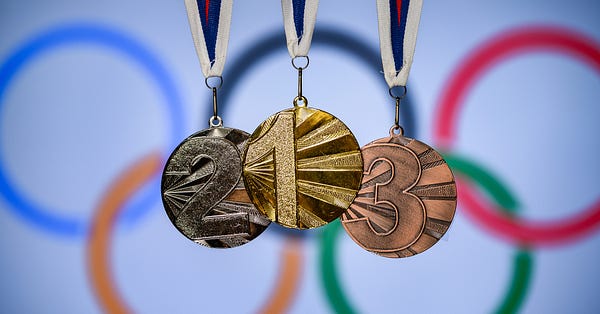
Top
Let’s start with the success stories.
First of all, the two gold medals won by Kosovo in judo.
As explained in an excellent article by Courrier Des Balkans, the credit has to be given to Driton Toni Kuka’s gym, founded at the end of the war in 1999 in a poor district of Peja.
The protagonists of this year’s social redemption stories are Distria Krasniqi, in the -48kg weight division, and Nora Gjakova, in the -57kg weight division.
This is the best result ever for the country, in its second appearance at the Olympic Games.
Recognized by the International Olympic Committee in 2014, Kosovo made its debut at Rio 2016 Summer Olympics and immediately won a gold medal.
Obviously in judo, thanks to judoka Majlinda Kelmendi.
Still as regards historical results, the silver medal of North Macedonia follows closely behind.
In taekwondo +80kg weight division, Dejan Georgievski secured Skopje the first second Olympic place in the country’s history.
The adventure began in Atlanta 1996 Summer Olympics and only four years later came the first ever medal.
In that case was a bronze - by Mogamed Ibragimov in wrestling - at Sydney 2000 Summer Olympics.
The strength of the Balkan athletes in hand-to-hand sports is certainly the common thread in these Olympic Games.
Thanks to judo, taekwondo, Greco-Roman wrestling and karate, all the countries that won medals have distinguished themselves in both female and male selections.
If you want to know all their names, just look at the BarBalkans’ Instagram story highlights, dedicated to Tokyo 2020.
Changing sport, we need to remember the “blue way" that links Croatia and Slovenia.
From canoeing and rowing to sailing, the two delegations won a total of 2 golds, 1 silver and 1 bronze.
In the same area of the Balkans, great results for Croatia in tennis and artistic gymnastics and for Slovenia in cycling and climbing.
Gold and silver arrived in Zagreb from tennis men’s doubles, in an all-Croatian final. Tin Srbić came second at the horizontal bar.
For Ljubljana, two expected medals from road cycling: a bronze won by Tadej Pogačar and a gold by Primož Roglič in the men’s time trial.
The Slovenian mark was imprinted also on the debut of a new discipline at the Olympic Games.
Janja Garnbret won the first ever (female) gold medal in sport climbing.


Last but not least, the performance of a phenomenon, Luka Dončić.
The Slovenian men’s basketball team was one step away from accessing the final (defeated by France in the semifinals by just one point) and then from winning the bronze medal (against Australia).
Nevertheless, the 22-year-old talent from Ljubljana led his teammates with the attitude of a real leader.
Not only with impressive statistics (in the tournament TOP3 for points, assists and rebounds), but also for team-man behaviors.
For example, during the first match, his Olympic debut. After scoring 48 points against Argentina (vice-world champion), with a few minutes left in the game he was just 7 points from the best performance of all time at the Olympic Games.
Instead of chasing an individual record, he asked the coach to take him off the field, to give minutes of playing time to his teammates for the next games.
The missed podium leaves a sour taste in mouth. But with this Dončić, Slovenian ambitions are very high in view of Paris 2024.
Flop
The delusions chapter seems ungenerous for athletes who have reached these sporting levels. But the eve’s high expectations cannot be ignored either.
The case of Novak Đoković is emblematic.
Arrived in Tokyo as the absolute ruler of the tennis season, everyone expected the Serbian player to reach the Olympic final and to aim for the so-called Golden Slam: Australian Open, Roland Garros and Wimbledon (already won), US Open and gold medal at the Olympic Games.
On the contrary, Đoković was defeated in the semifinal by Alexander Zverev and abdicated in the final for third place against Pablo Carreño Busta.
No medal - not even the mixed doubles final - for a tennis player who just missed an almost unrepeatable appointment with history.
It was not a great Olympic summer even for the Balkan flag bearers.
This is the case for Croatian Josip Glasnović, excluded by his 22nd result out of 29 on the second qualifying day in trap shooting. Or even for Slovenian Bojan Tokić, out in the round of 32 in table tennis singles.
However, this is particularly true for Montenegro, focused on men’s water polo and women’s handball (both captains bore the national flag).
Neither Draško Brguljan’s team nor Jovanka Radičević’s team managed to reach the semi-finals, losing their dreams of a medal.
Hence, the red thread of another flop. Team sports.
Not only Montenegro, but also Serbia and Croatia had the possibility to add golds and silvers to their medal table.
Only Serbian men’s water polo team made it to the top of the podium, on the last day of the Olympic Games (defeating Greece in the final).
Nothing for the Croats, who finished the tournament in 5th place.
For the Serbian female teams, the eve’s set objective was to play their respective finals.
While the volleyball team won the bronze medal, basketball was a great disappointment. After the elimination in the semifinal against the US, the Serbian players were defeated also by France in the final for the third place.
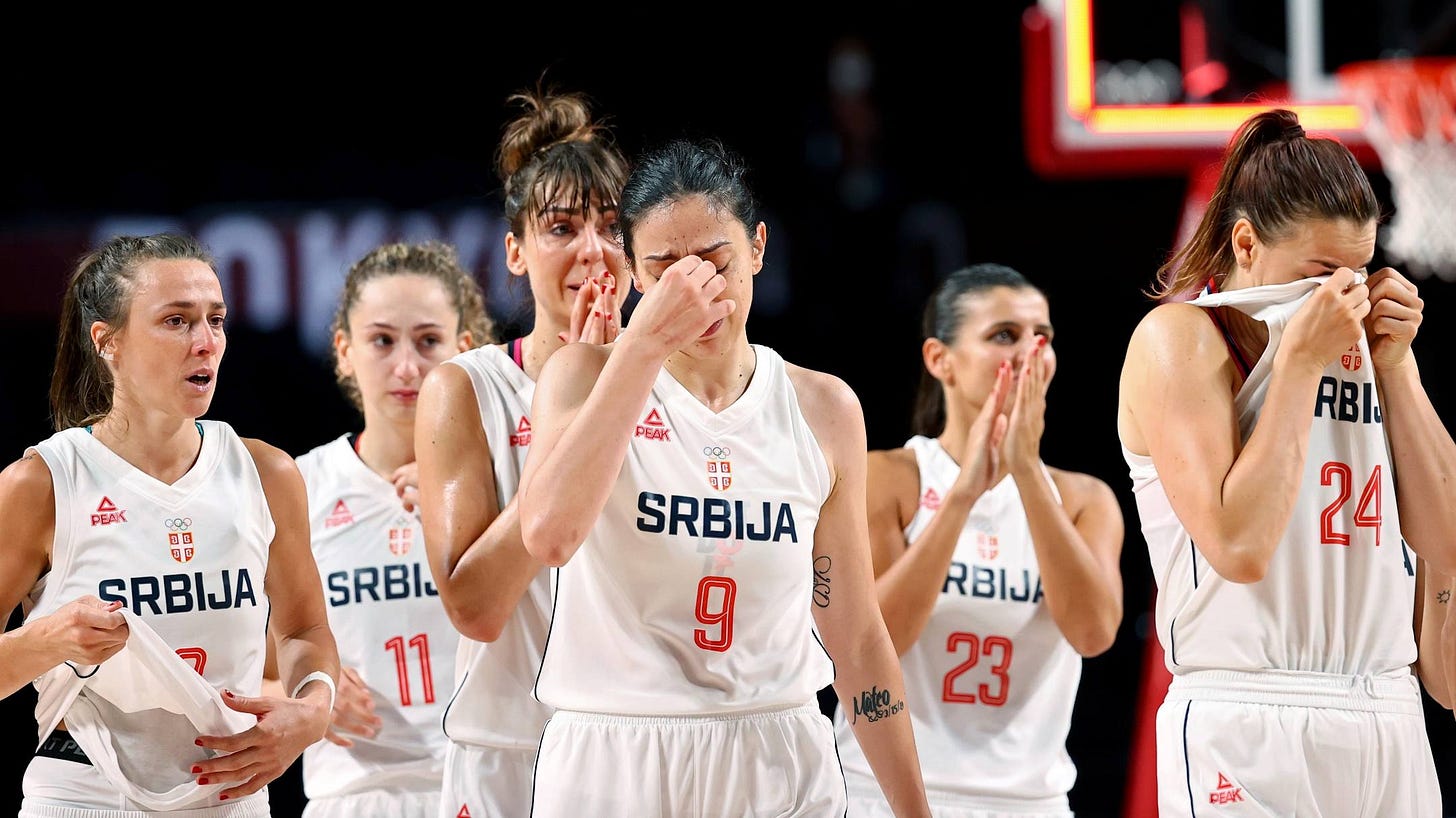
On the other hand, the lack of medals for Albanians and Bosnians should be put into context.
Talking about failure for the two delegations would be really ungenerous, since no athlete was really in a position to end up on the podium.
But it is also true that an Olympic edition like this cannot be defined a “sports success”.
For example, even before Tokyo 2020 Summer Olympics began, the Albanian National Olympic Committee had announced the need to understand how to enhance sports engagement in the country, starting with schools.
The timing of this statement made it clear that nothing significant was expected from the 9 athletes who left for Japan.
The Olympic Committee of Bosnia and Herzegovina will also have to do some systematic thinking, as all the pressure was on the shoulders of a fifteen-year-old swimmer, Lana Pudar.
Given the age, her exclusion from the 100m butterfly semifinal for 24 hundredths of second still gives hope for the future.
However, a competitive and wide-ranging environment will have to grow around her in view of the next Olympic Games. And not just in swimming.
Pit stop. Sittin’ at the BarBalkans
We have reached the end of this piece of road.
Following the Olympics theme, we take a step into the past at our bar, the BarBalkans.
More precisely in the Sarajevo 1984 Olympic Winter Games, when Yugoslavia was united.
This is made possible by the ‘84 Olympics APA beer, brewed by ‘84 Olympics Craft Brewery, based in the Bosnian capital city.
While sipping this American Pale Ale, we remember the past, think about the present and imagine the future of sport in the Balkans.
Let’s continue the BarBalkans journey. We will meet again in a week, for the 2nd stop of this second year together.
A big hug and have a good journey!
BarBalkans is a free weekly newsletter. Behind these contents there is a lot of work undertaken.
If you want to help this project to improve, I kindly ask you to consider the possibility of donating. As a gift, every second Wednesday of the monthyou will receive a podcast with an article about the dissolution of Yugoslavia.
Every month you can listen to the preview of BarBalkans - Podcast on Spreaker and Spotify. The last episode was out on Wednesday, don’t miss it!
Pay attention! The first time you will receive the newsletter, it may go to spam, or to “Promotions Tab”, if you use Gmail. Just move it to “Inbox” and, on the top of the e-mail, flag the specific option to receive the next ones there.
I thank you for getting this far with me. If you want to dive in the past year, you can find here all the newsletters.






